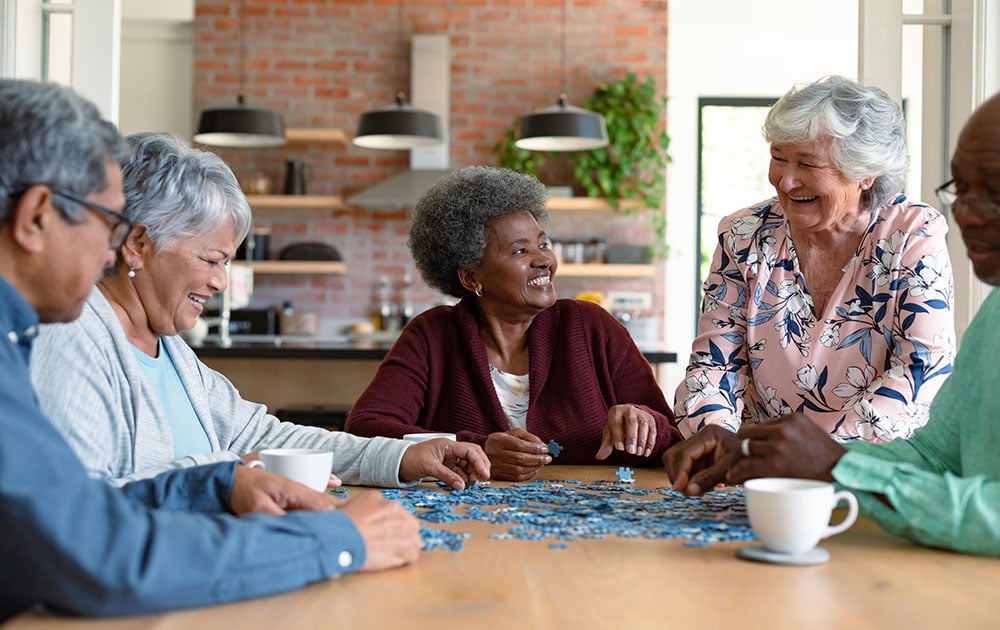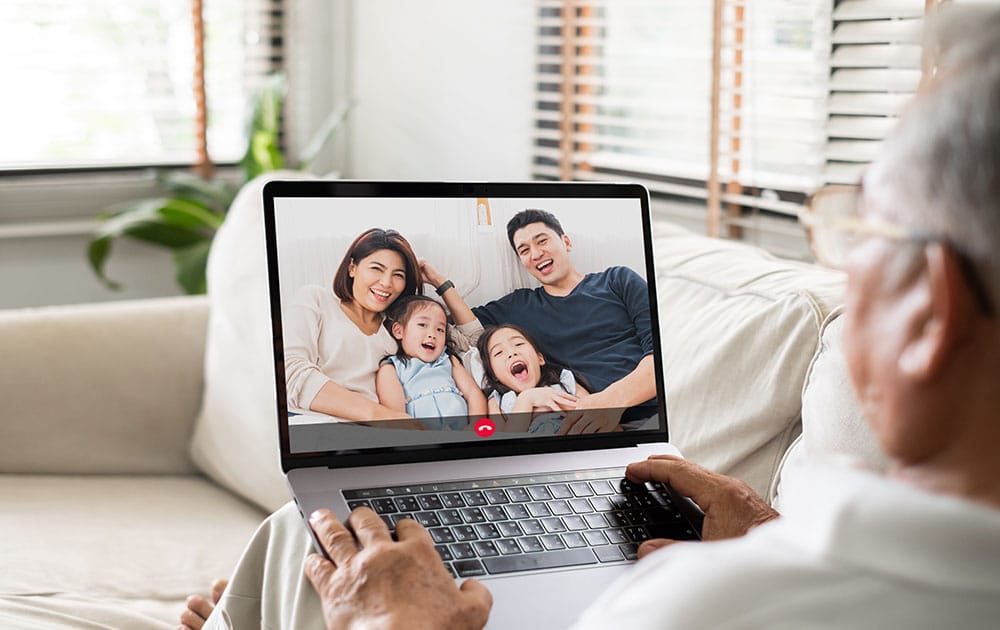
How to Help Your Senior Parent Avoid Diabetes Complications
May 2, 2022
How to Stay Sharp in Old Age: 10 Tips to Help Your Parent
May 16, 2022How to Prevent Senior Isolation and Boredom
Table of contents
- What causes seniors to become lonely and bored?
- The health risks of senior isolation and boredom
- How to keep senior parents connected
- The benefits of residential care
- Parentis Health can help
The National Health and Aging Trends Study surveyed community-dwelling adults age 65 and older in the United States prior to the COVID outbreak. They found that 24% of seniors (or about 7.7 million people) reported being socially isolated. Additionally, about 4% (1.3 million) qualified as severely socially isolated.
Feeling lonely or bored can have adverse effects on your physical and mental health. Socially isolated seniors are particularly at risk.
Fortunately, there are resources available to help aging adults stay connected. Here are some tips for preventing senior isolation and boredom in your elderly parent. (smileyspoints.com)

What causes seniors to become lonely and bored?
Senior isolation occurs when there is a lack of social contact with others. Loneliness is the feeling of being lonely or negatively viewing your isolation.
Not everyone who is socially isolated is lonely. For example, some people naturally spend more time by themselves and aren’t bothered by it. Others have many social connections but still feel lonely because their emotional needs aren’t met.
Researchers have identified groups of people who are more likely to experience social isolation, resulting in loneliness and boredom. They include seniors who are:
- Unmarried
- Male
- Low income
- LGBTQ+
- Have cognitive deficits or dementia
Other characteristics such as living alone, having moved frequently, being in poor health, having a disability, or having sensory deprivation (such as hearing loss) can also play a role.
Where your parent lives can also affect how isolated they feel. For instance, aging parents who live in more rural areas may experience more isolation. These areas often aren’t walkable and lack public transportation for seniors who can no longer drive. Seniors might also have fewer in-home services available.
Retirement from work is a time when many seniors are at increased risk of becoming isolated. Researchers have found that the number of social relationships that a retiree has is as good a predictor of their quality of life as physical activity.
The health risks of senior isolation and boredom
Psychiatric conditions such as depression and anxiety can lead to social withdrawal. In turn, the isolation can make feelings of depression and anxiety worsen.
But isolation doesn’t just affect seniors’ mental health; it can impact their physical health as well. The adverse effects of senior isolation and boredom rival the impacts of obesity and smoking.
Social isolation and loneliness have been associated with an increased risk of developing:
- Coronary artery disease
- Stroke
- Early mortality
- Cognitive decline and dementia
Low connection to family, friends, or social groups is also associated with:
- Worse outcomes for people with heart disease
- A greater likelihood of ending up back in the hospital after a heart attack
- More frequent trips to the emergency room for people with heart failure
Social interaction keeps your parent’s mind active and gives them a sense of self. More and more, research shows that living a socially fulfilled life can protect your senior parent’s health and well-being.
How to keep senior parents connected

There are currently more ways than ever for seniors to stay connected to their friends and family. That is to say, senior isolation and boredom don’t have to be an inevitable consequence of aging.
Here are some ways that your senior parent can stay connected as they age:
- Group activities: These are a low-pressure way for seniors to meet new friends. They could sign up for an interesting activity such as a class for something they have wanted to learn, a volunteer group, or a faith-based group.
- Residential living: Residential living homes allow seniors to maintain their independence while still having easy access to friends and social activities.
- Technology: Many seniors are more tech-savvy than we give them credit for. Older parents may find it easier than ever to utilize social media, video conferencing, or other communication technologies to keep in contact.
- Professional help: If you feel like isolation is causing your parent to become depressed, help them seek out a counselor or therapist. The counselor can help your parent develop a plan to manage and increase their social connection.
The benefits of residential care
People are generally social by nature, and maintaining social relationships can help them live longer, healthier lives. Healthcare agencies can be an important, but often overlooked, partner in preventing loneliness.
One way to prevent senior isolation and boredom is to consider residential care. Residential Care Facilities for the Elderly (RCFEs) are similar to assisted living facilities, but smaller and allow for more personalized care.
RCFEs are modeled after a traditional home setting. They feature a small number of residents and a low caregiver to resident ratio. Consequently, this provides an intimate, home-like setting.
Residential homes promote social connection by offering:
- A choice of private or shared rooms
- Home-cooked meals served together
- Living rooms or gardens for socializing
- Holiday and birthday celebrations
- Walkable areas for fresh air and exercise
Caregivers live in the home and are available 24/7. Nursing staff visit the home frequently. Family and friends are able to visit the home regularly.
In addition to social needs, residential care homes can easily provide health services. These include home health, transportation, and hospice services.
Parentis Health can help
Social isolation and boredom can take a toll on seniors’ mental and physical health. A residential care facility can help your parent stave off social isolation by providing a warm and supportive environment.
Verona Court offers a whole-person approach to recovery and everyday care, including:
Supportive activities: creating comfortable, familiar living spaces, playing music, bingo, promoting personal creativity, and employing sensorial techniques like pet therapy and aromatherapy.
Empowerment activities: many of the same kinds of activities residents enjoyed in their own homes, like cooking, gardening, and socializing, as well as ample opportunities to connect with Verona Court staff and volunteers.
Maintenance activities: from exercise and discussion groups to spiritual support, Verona Court residents have many opportunities to socialize and experience active, engaging lives.
Reach out to Parentis Health and Verona Court today and find out how we can help your family prevent senior isolation and boredom. Together, we can keep your loved one stay connected and well!

